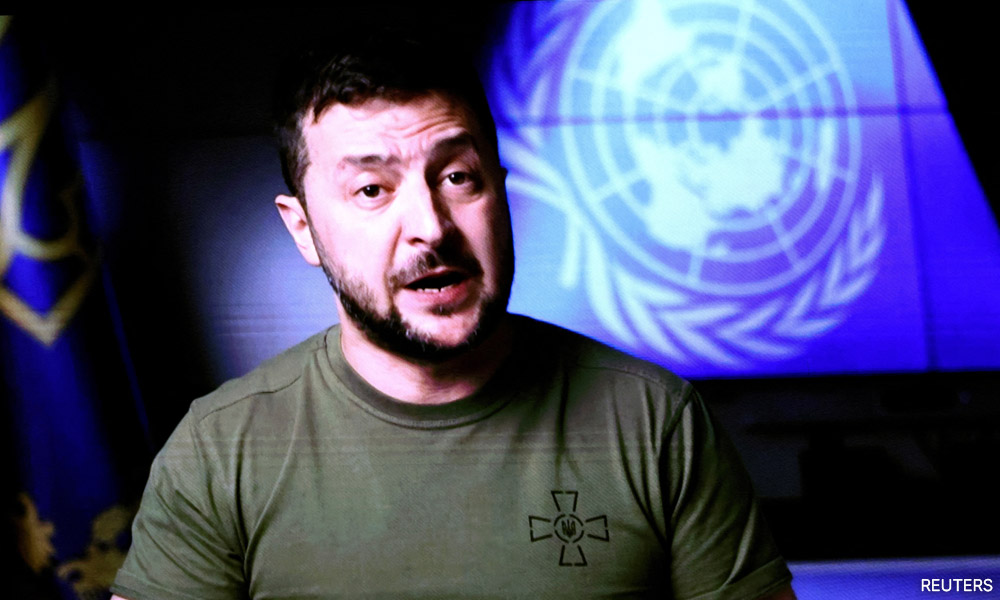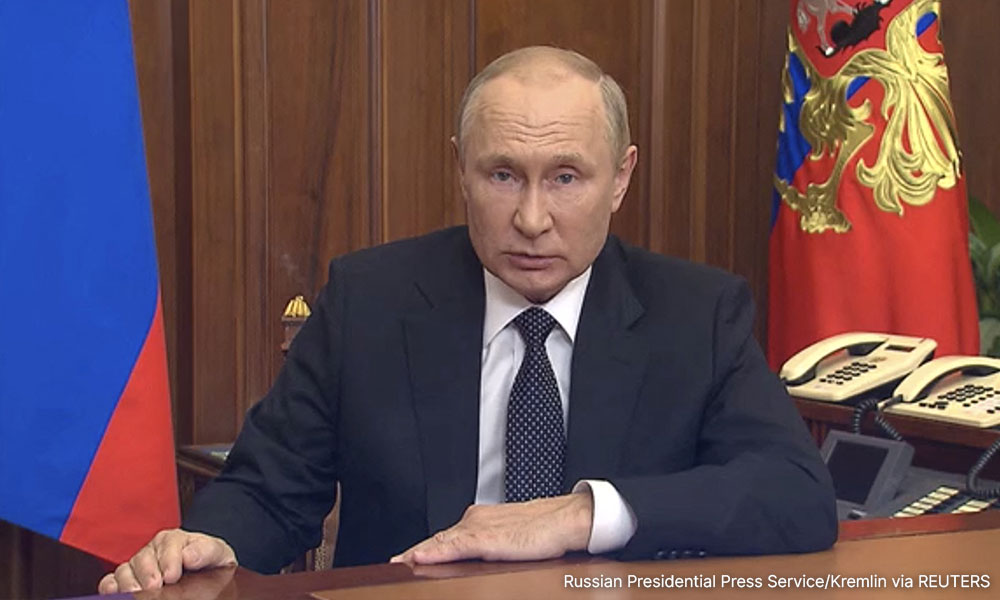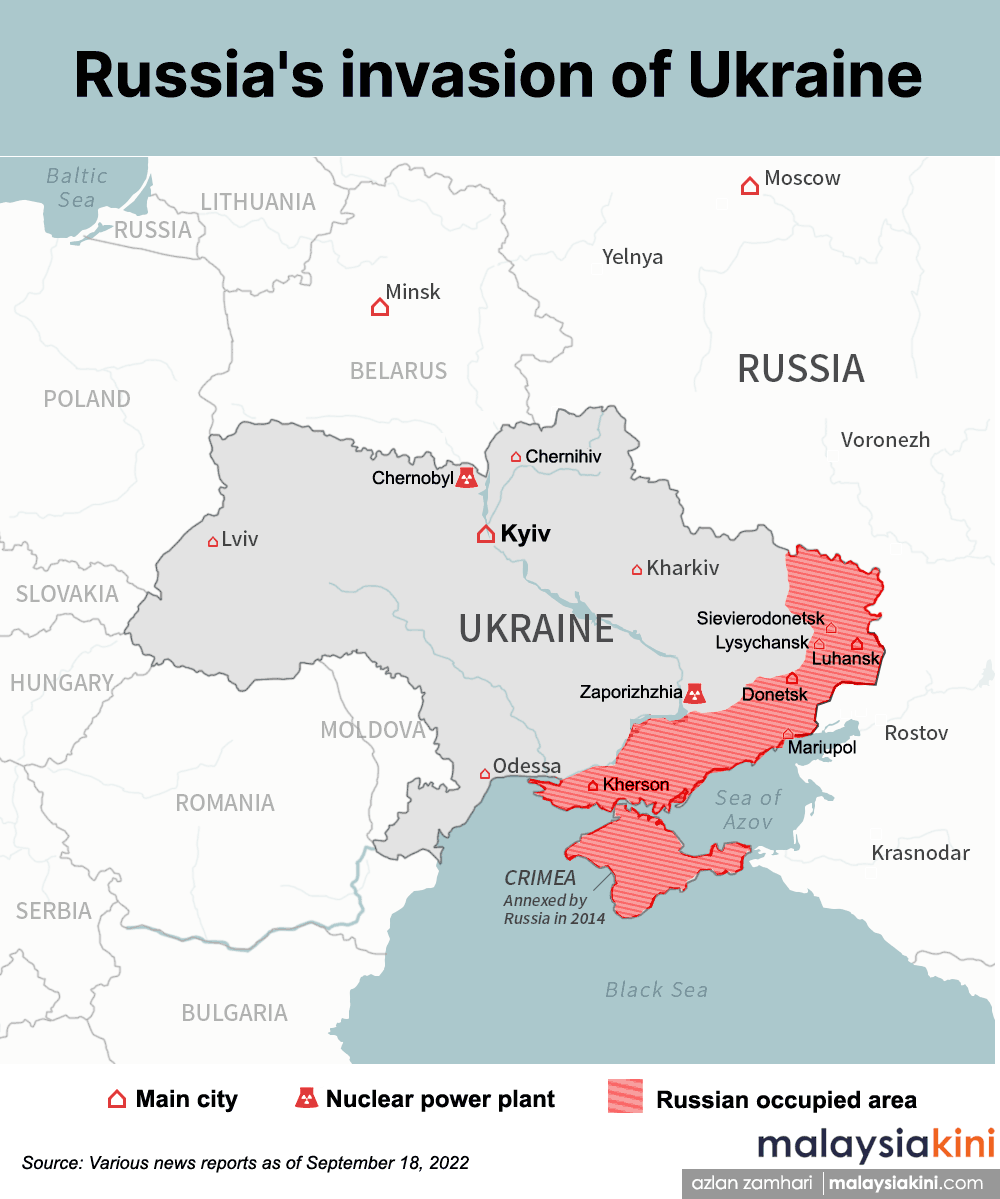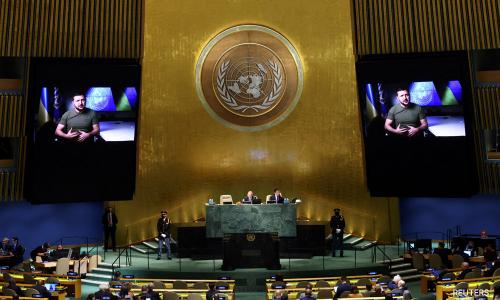UN showdown looms as Ukraine calls for Russia to be stripped of veto rights
Ukraine demanded the United Nations (UN) punish Russia for its invasion and strip it of its security council veto as a showdown loom today when the UN Security Council meets over atrocities committed in Ukraine.
The Security Council meeting comes a day after Russian President Vladimir Putin ordered the mobilisation of hundreds of thousands of Russians to fight in Ukraine, moved to annex swaths of Ukrainian territory and threatened to use nuclear weapons.
"A crime has been committed against Ukraine and we demand just punishment," President Volodymyr Zelenskiy told world leaders at the UN General Assembly on Wednesday.
Zelenskiy called for a special UN tribunal to impose "just punishment" on Russia and for it to be stripped of its veto.
The council has been unable to take any meaningful action on Ukraine because Russia is a permanent veto-wielding member along with the US, France, Britain and China.
The meeting today will be at least the 20th time the UN Security Council has met on the Ukraine issue this year.

Russian Foreign Minister Sergei Lavrov will face off with his Ukrainian and Western counterparts, including US Secretary of State Antony Blinken, when UN secretary-general Antonio Guterres and International Criminal Court prosecutor Karim Khan brief the 15-member Security Council.
Ukraine, the US and others have accused Russia of war crimes in Ukraine. Russia denies targeting civilians in what it calls its "special military operation," describing accusations of human rights abuses as a smear campaign.
'East-West clash'
Yesterday, Putin ordered Moscow's first wartime mobilisation since World War II, with plans to immediately start conscripting some 300,000 troops to fight on the frontline.
He cast the Ukraine invasion, which began in February and has left thousands dead, displaced millions and reduced towns to rubble, as a defining East-West clash.
Russia's mobilisation may be the riskiest domestic political move of Putin's two decades in power, and followed months of Kremlin promises it would do no such thing and comes at a time when Russia has been facing a string of battlefield failures.
Concern over being conscripted saw flights out of Russia quickly sell out, and jailed opposition leader Alexei Navalny called for mass demonstrations against the mobilisation.

Independent protest monitoring group, OVD-Info said nearly 1,400 people in 38 Russian cities had been detained in protests by yesterday evening.
Putin ordered the military draft in a televised address in which he also announced moves to annex four Ukrainian provinces and threatened to use nuclear weapons to defend Russia, declaring: "It's not a bluff".
Pro-Russian figures announced referendums for Sept 23-27 in Luhansk, Donetsk, Kherson and Zaporizhzhia provinces, representing around 15 percent of Ukrainian territory.
US President Joe Biden, in a speech to the UN General Assembly, responded: "Again, just today, President Putin has made overt nuclear threats against Europe, in a reckless disregard for the responsibilities of the non-proliferation regime”.
Canadian Prime Minister Justin Trudeau condemned Putin's "irresponsible escalation of the war", saying "Putin's behaviour only goes to show that his invasion is failing”.
European Union foreign ministers agreed yesterday to prepare new sanctions on Russia and increase weapons' deliveries to Kyiv.
"It's clear that Putin is trying to destroy Ukraine," EU foreign policy chief Josep Borrell told reporters after ministers met to decide how to respond.

Foreign ministers from the Group of Seven (G7) advanced economies confirmed in a meeting in New York yesterday their cooperation in extending support for Ukraine, Japanese Foreign Minister Yoshimasa Hayashi said.
Russia and Ukraine carried out an unexpected prisoner swap yesterday, the largest since the war began and involving almost 300 people, including 10 foreigners and the commanders who led a prolonged Ukrainian defence of Mariupol earlier this year.
Prison swap
The foreigners released included two Britons and a Moroccan who had been sentenced to death in June after being captured fighting for Ukraine.
Also freed in the deal brokered by Saudi Arabia, according to a Saudi ministry, were three other Britons, two Americans, a Croatian and a Swedish national.
The released Ukrainians had been captured after a long battle for the port city of Mariupol earlier this year and included top military commanders, said Andriy Yermak, the head of Zelenskiy's office.
Several Western military experts said drafting hundreds of thousands of new troops would take months, do little to slow Russia's losses and could even make matters worse by drawing resources away from the battlefield to train and equip recruits.
In Moscow's first update on casualty numbers in almost six months, Russia's Defence Minister Sergei Shoigu said 5,937 Russian soldiers had been killed since the start of the conflict.
The war has so far appeared to enjoy popular support in Russia where independent media have all been shut down and public criticism of the "special military operation" is banned.
But for many ordinary Russians, especially in the urban middle classes, the prospect of being sent to fight would be the first hint of the war affecting them personally.
On the Moscow metro, men could be seen studying call-up papers.
"You always feel worried at moments like these. Because you have a wife and kids and you think about it," one resident told
- Reuters
RM12.50 / month
- Unlimited access to award-winning journalism
- Comment and share your opinions on all our articles
- Gift interesting stories to your friends
- Tax deductable

